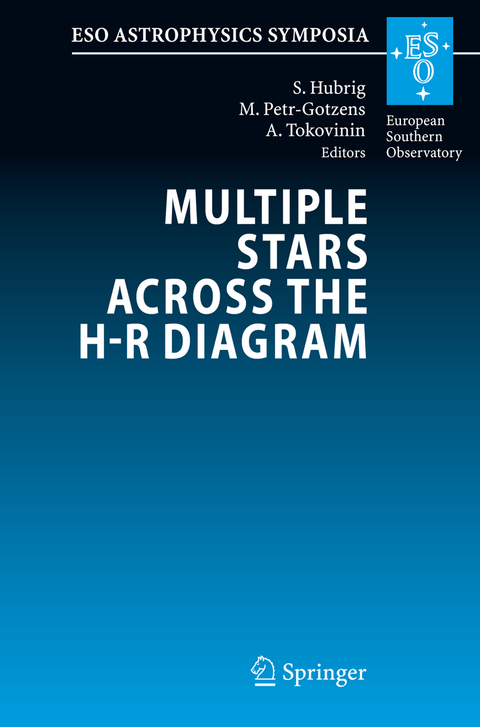
Multiple Stars across the H-R Diagram
Springer Berlin (Verlag)
978-3-642-09422-4 (ISBN)
Evolutionary Processes in Multiple Systems.- Dynamics and Stability of Triple Stars.- Multiple Stars: Physics vs. Dynamics.- Gliese 225.2: An Old (Stable?) Quadruplet.- Multiple Stars: Designation, Catalogues, Statistics.- Radial-velocity Studies of Certain Multiple Systems.- Spectral Disentangling Applied to Triple Systems: RV Crt.- Evidence for Rapid Variability in the Multiple System 68 u Her.- DG Leo: A Triple System with a Surprising Variety of Physical Phenomena.- A Spectroscopic Study of HD 208905.- The Suspected Binarity of the Nearby Flare Star Gl 424.- The Ecology of Dense Star Clusters with Binaries.- The Formation of Multiple Stars.- Population of Dynamically Formed Triples in Dense Stellar Systems.- Interferometric Studies of Multiple Stars.- Interferometric Orbits of New Hipparcos Binaries.- New Facts about ? Velorum: Fewer but Larger Components.- Speckle Interferometry of Two Low-mass Triple Systems in the Solar Neighbourhood.- Tertiary Companions to Close Spectroscopic Binaries.- Spectroscopic Subcomponents in Visual Double Stars: The Most Probable Values of their Physical and Orbital Parameters.Application to the System WDS 14404+2159.- Multiple Stars in the Field.- Multiplicity of Chemically Peculiar Stars.- Multiplicity of Contact Binary Stars.- Extrasolar Planets in Double and Multiple Stellar Systems.- Homogeneous Comparison of Directly Detected Planet Candidates: GQ Lup, 2M1207, AB Pic.- Searching for Planets Around Stars in Wide Binaries.- Multiplicity at the Very Low Mass End of the H-R Diagram.- Spectroscopic Companions of Very Young Brown Dwarfs.- The Observed Multiplicity of Low-mass Stars: From Embedded Protostars to Open Clusters.- High-order Multiplicity of PMS Stars: Results from a VLT/NACO Survey.- Accretion onto Binary YSOs Through Gapfrom Their Circum-binary Disk.- The Nearest Pre-Main Sequence Multiple Stars.- A Study of the Young Quadruple System AO Vel with a ZAMS Eclipsing BpSi Primary and PMS Companions.- Multiplicity of Massive Stars.- The Triple System ?1 Orionis A in the Heart of the Orion Trapezium Cluster.- The Primordial Binary Population in OB Associations.- Multiplicity of Early-type Stars in the Field: Progress Report.- Search for Low-mass Companions to X-ray Emitting A-type Stars.
| Erscheint lt. Verlag | 30.11.2010 |
|---|---|
| Reihe/Serie | ESO Astrophysics Symposia |
| Zusatzinfo | XIII, 305 p. |
| Verlagsort | Berlin |
| Sprache | englisch |
| Maße | 155 x 235 mm |
| Gewicht | 485 g |
| Themenwelt | Naturwissenschaften ► Physik / Astronomie ► Astronomie / Astrophysik |
| Schlagworte | Accretion • Binary stars • exoplanets • globular clusters • Interferometry • Multiple Stars • spectroscopy • Star • Stellar • Stellar Clusters |
| ISBN-10 | 3-642-09422-8 / 3642094228 |
| ISBN-13 | 978-3-642-09422-4 / 9783642094224 |
| Zustand | Neuware |
| Haben Sie eine Frage zum Produkt? |
aus dem Bereich


